Number 16
HIMALAYAS PLUS
September-October 2025
Dear All,
Greetings from the Centre of Excellence for Himalayan Studies (CHS), Shiv Nadar Institution of Eminence (SNIoE). We are pleased to present the 16th edition of our Newsletter, covering the months of September and October 2025. Previous editions of HIMALAYAS PLUS can be accessed on our website.
Publications
CHS Non-Resident Senior Fellow, Kaveri Gill, wrote an article in The Druk Journal on mindful governance and Bhutan’s development model, drawing on Amartya Sen’s ‘capability approach’ to contrast Bhutan’s holistic vision with mainstream economic paradigms.
CHS Associate Fellow, Devendra Kumar, wrote an article for China Brief examining Xi Jinping’s visit to the Tibet Autonomous Region arguing that the visit underlined Tibet’s centrality in his national policy agenda and is a sign of the increasing central oversight over Tibetan affairs over the last decade.
CHS Director, Jabin T. Jacob, wrote an article on the nature of China’s role as a mediator in international conflicts for the foreign policy magazine, India’s World. This article was later translated and published on CHS Website in Nepali, Urdu and Tibetan.
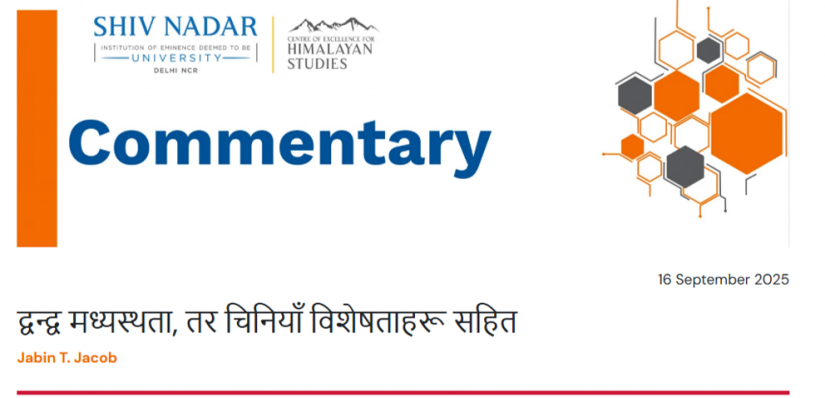
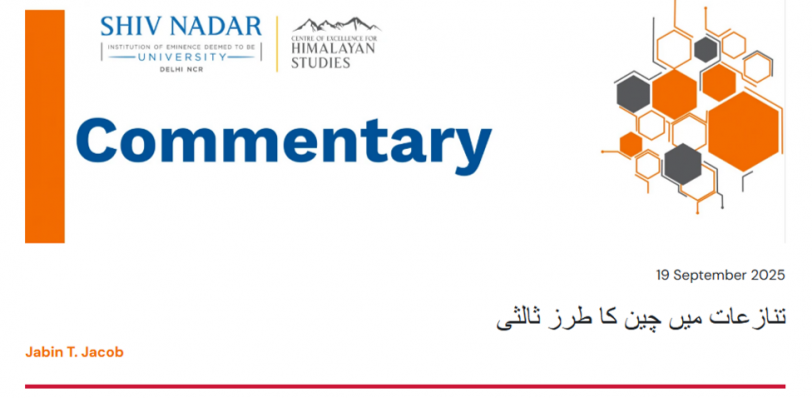
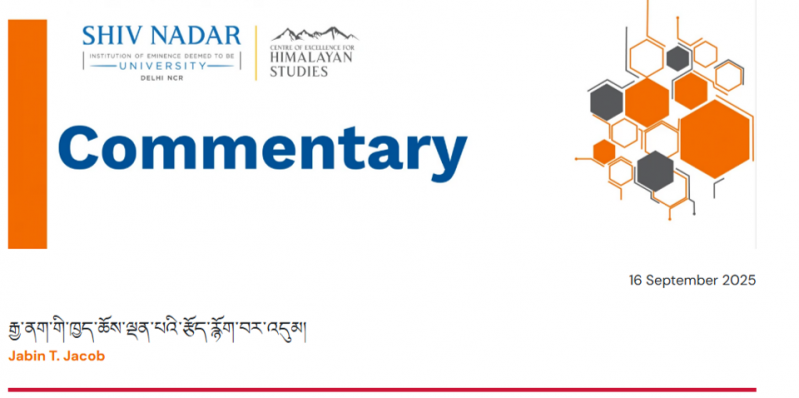
CHS Post Doctoral Fellow, Rinan Shah’s wrote an Issue Brief examining the current legal frameworks governing springs across the Indian Himalaya, expanding CHS’s research on resource governance.
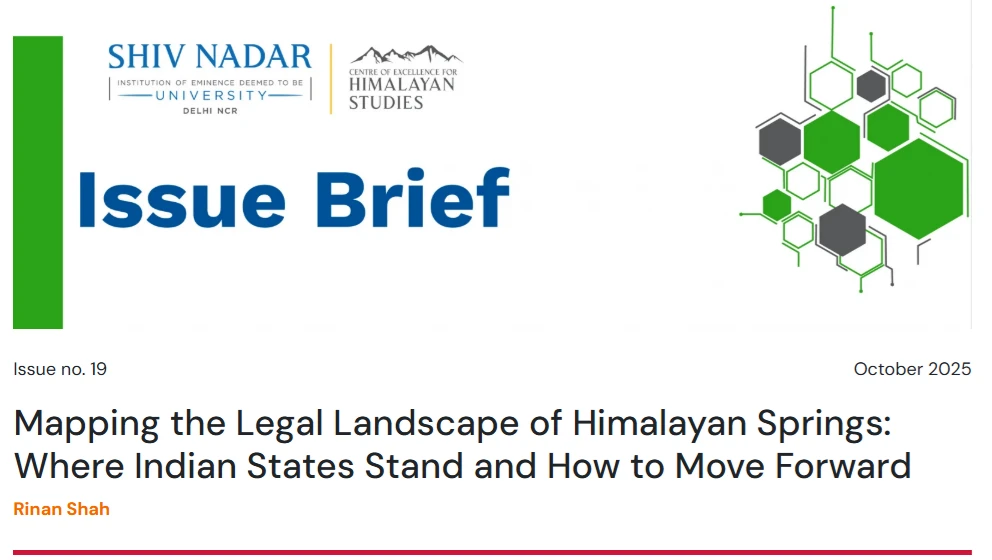
CHS Post-Doctoral Fellow, Padma Ladon wrote two Commentaries on the Indian Army’s medical outreach, and the dynamics between strategic infrastructure and ecological fragility in the Himalayas. In addition, she authored an Issue Brief on the plastic waste crisis in Ladakh, underlining environmental governance challenges in high altitude ecosystems.
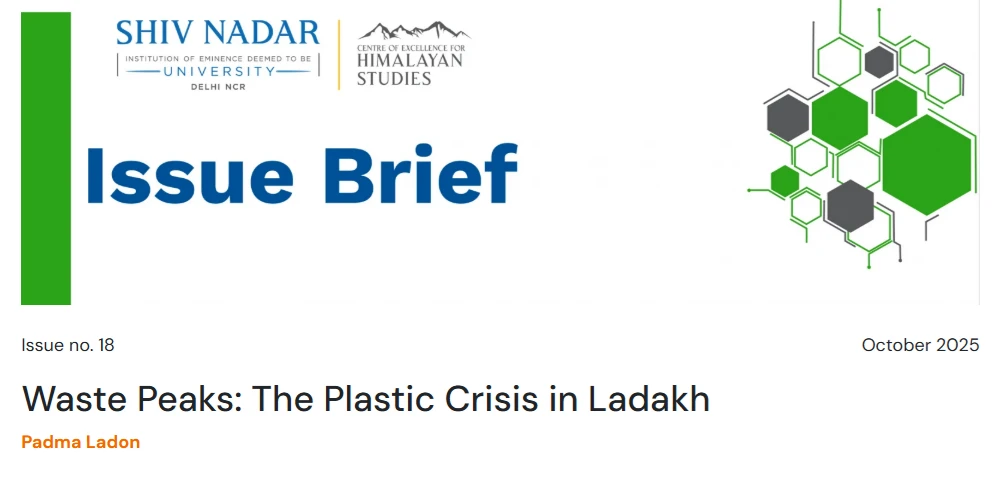
Vimal Khawas Professor, Special Centre for the Study of North East India, Jawaharlal Nehru University, authored a Commentary on the success of community-driven spring-shed management in restoring water flows, recharging groundwater, and empowering local communities.
Anshuman Behera, Professor National Institute of Advanced Studies, Bangalore, in a Commentary, analysed the recent youth-led protests in Nepal as a powerful indictment of entrenched corruption, nepotism, and democratic backsliding.
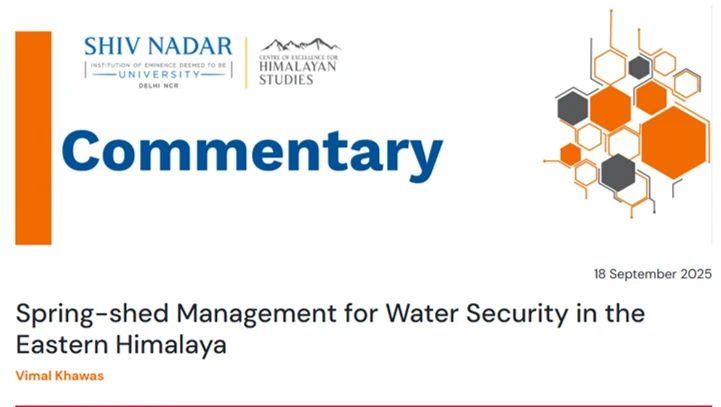
Rustam Ali Seerat, an independent researcher based in Rome, contributed a Commentary on the Taliban regime’s careful hedging of its relations between China and the United States.
Amrita Saikia, Assistant Professor, Woxsen University, Hyderabad authored a Commentary that raises critical questions about the complex relationship between dams, the environment, marginality, and rights of indigenous communities in Arunachal Pradesh.
CHS Post-Doctoral Fellow, Sangay Lachenpa, wrote a Commentary on the integration of the Dzumsa system of traditional governance into modern forms of governance in Sikkim, while Anirudhha Jena, Assistant Professor at the Indian Institute of Management Kashipur, wrote a Commentary describing the importance of community radio and its climate-related communications in the Himalayas.
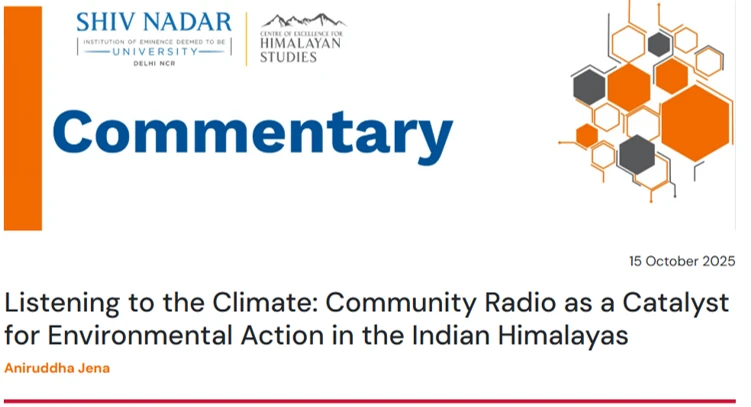
In the Media
CHS Distinguished Fellow, Claude Arpi wrote in Firstpost on India’s efforts to strengthen border communities through the Vibrant Village Scheme, critiqued China’s claims over Barahoti in Uttarakhand, and examined the recent purges within the PLA’s top ranks.
Jabin T. Jacob, in conversation with Frontline’s Latitude series, discussed the Modi–Xi meeting at the SCO summit, addressing border disengagement, trade imbalances, Pakistan, and India’s role in a multipolar Asia. He also spoke to the China Global South Project on the continuing fragility of India-China relations despite the apparent thaw in relations.
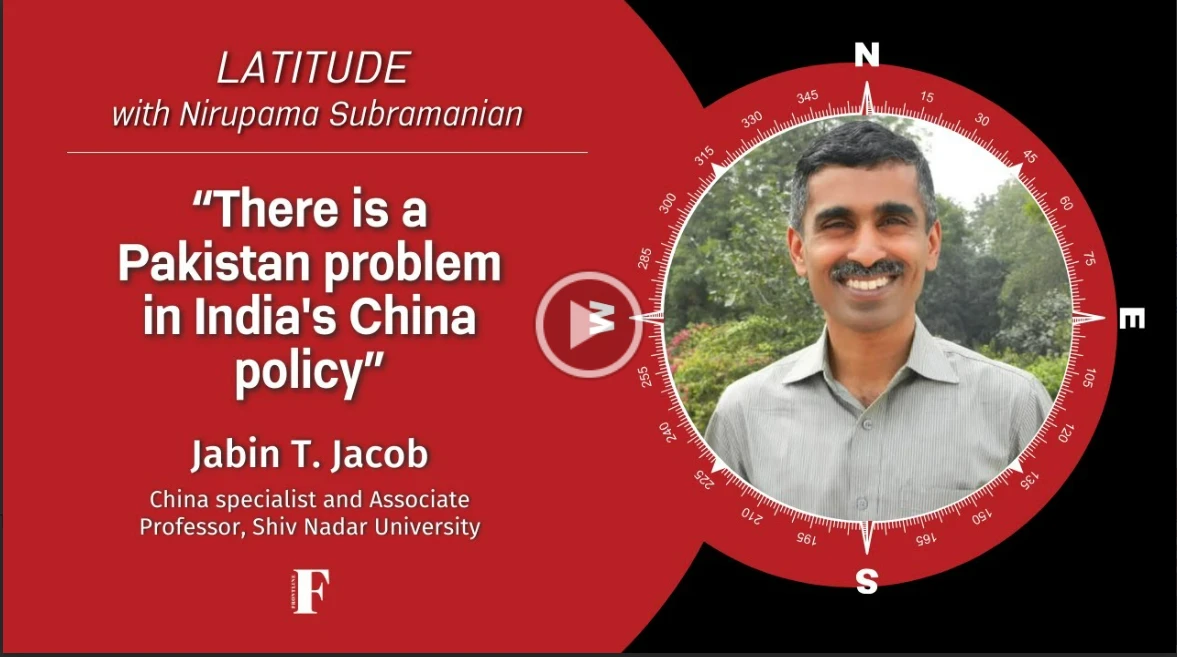
Jacob also wrote in The Indian Express on the shifting contours of US–China relations, highlighting how current debates often focus narrowly on America’s decline and China’s rise, missing the broader forces driving this global rivalry. He was quoted in ABP Live and spoke on DW News on the SCO’s evolving dynamics.
Anand P. Krishnan, writing in The Indian Express, analysed China’s K visa initiative as part of its strategy to attract global STEM talent amid shifting U.S. immigration trends. He was also quoted in The Hindu on the implications of the K visa for Indian professionals and in France’s Le Monde on South India’s rise as a major iPhone assembly hub.
Jacob and Krishnan co-authored two Malayalam articles in the aftermath of Indian Prime Minister Narendra Modi’s visit to China for the SCO Summit. They analysed the regional and global forces shaping India-China relations in the Malayala Manorama while in their piece for the Mathrubhumi, they examined India’s vulnerabilities amidst the push for more bilateral economic engagement, including the lack of economic-administrative reforms.
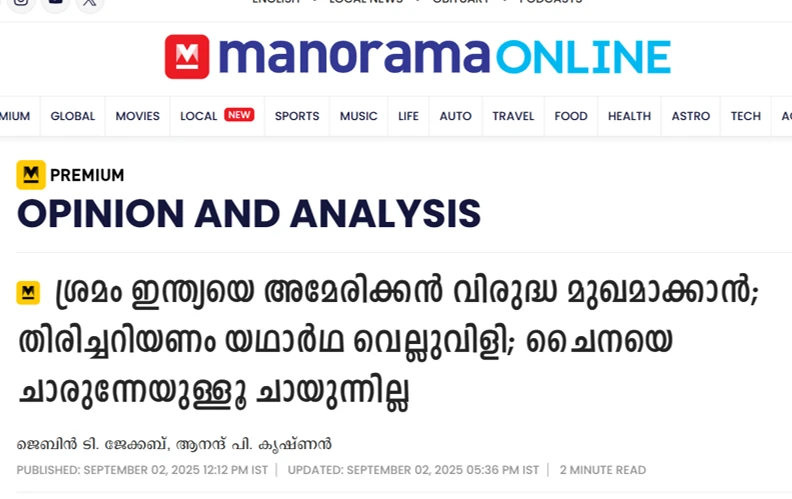
FACULTY UPDATE
Claude Arpi spoke at the Garhwal Rifles Regimental Centre on ‘Interwoven Roots: Shared Indo-Tibetan Heritage’, where he discussed the historical and cultural dimensions of the Indo-Tibetan boundary in the Garhwal sector. His visit included field interactions at Joshimath Brigade, Mana and Niti’s ‘First Villages’, and other frontier settlements. He also delivered a talk on the topic, ‘Beyuls – Hidden Realms of Guru Padmasambhava’ at the Pavilion of Tibetan Culture in Auroville, exploring their spiritual and historical significance, and curated a two-month exhibition at the same venue.
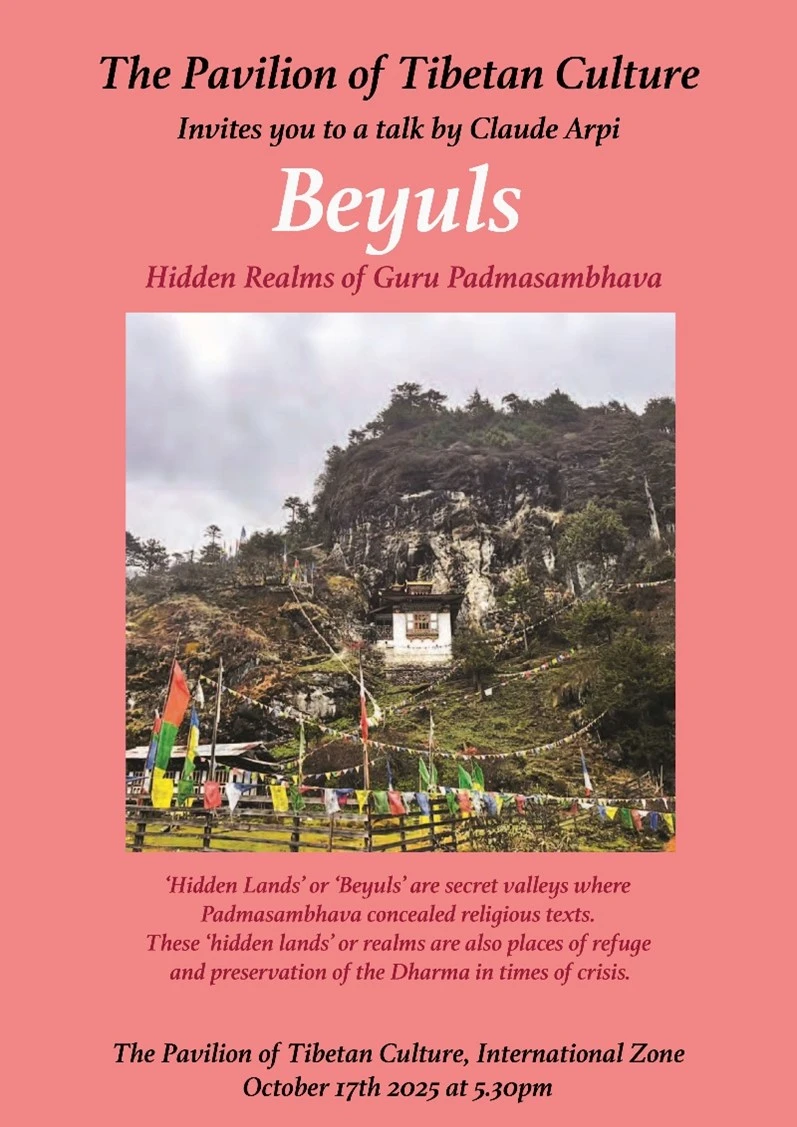
Devendra Kumar participated in several academic and policy forums in September and October 2025. He spoke on China’s evolving Tibet policy at Ashoka University, examined cadre management and governance strategies under Xi Jinping’s leadership for the REMOTE XUAR Project (a collaboration between Palacký University Olomouc, University of Würzburg, and Université libre de Bruxelles), and analysed Chinese influence operations in South Asia at a conference jointly organized by the Centre for Social and Economic Progress and the Centre for Contemporary China Studies, Ministry of External Affairs, New Delhi. Anand Krishnan was also a speaker at the latter conference highlighting Chinese capital’s permeation of India’s electronics industry while Jabin Jacob moderated a conversation on China’s regional and global influence beyond South Asia. Krishnan made a presentation on Chinese domestic discourses on industrialization and labour at the State of Field session of the 18th All India Conference of China Studies, organized by Institute of Chinese Studies, Delhi and Indian Institute of Management, Indore.
Kaveri Gill delivered a lecture at the School of International Studies, Jawaharlal Nehru University, on 4 September titled, ‘the Dalai Lama’s third life commitment and Tibet’s environmental future’.
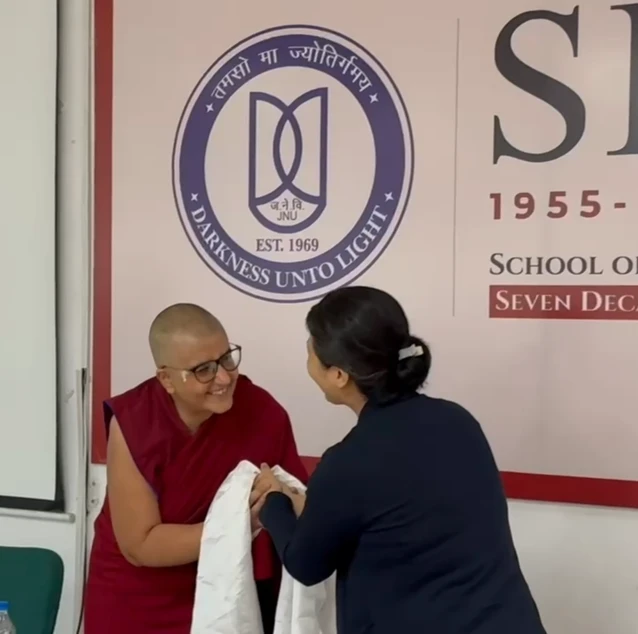
Jacob also delivered a series of lectures and participated in panel discussions through September and October 2025. He online talks on the ‘evolving dynamics of India–China relations since 2020’ for the NMIMS Kirit P. Mehta School of Law, Mumbai, and on ‘China’s strategic engagement in South Asia’ at the Takshashila Institution, Bengaluru. He was a panellist discussing the ‘Shanghai Cooperation Organisation Summit and emerging shifts in India–China relations’ at the O. P. Jindal Global University International Academy in New Delhi, and examining the difficulties in India’s economic policy on China in a Mint webinar.
In September, CHS Non-Resident Senior Fellow, Kalzang Dorjee Bhutia conducted a workshop on indigenous ink-making and prayer flag printing at the Tibetan Canadian Cultural Centre, Toronto, supported by the Hidden Stories project (University of Toronto and Princeton University). In October, he presented his research on indigenous fire knowledge and cultural burning practices at the University of London conference, “From Green Living to Buddhist Environmentalism”.
You can stay updated with our publications, events, and activities through our website, X (@Himalayas_SNU), Facebook, and LinkedIn. You can also find previous Newsletters on our website.
Share this: